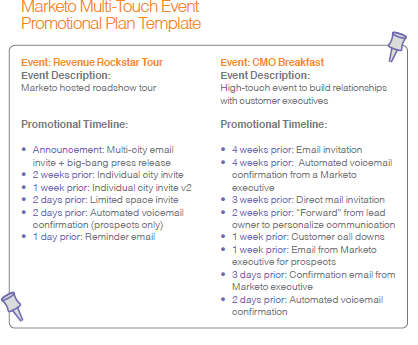There is always so much going on around the Holidays! Your weekends are packed with parties and at work you are trying to get everything done before the New Year. And like most marketers, you are trying to determine what your 2013 event schedule will look like, and plan your accompanying strategy.
We know that on average, marketers spend 20% of their marketing budget on events, which is a sizeable amount. Events provide a unique opportunity for lead generation, branding, customer and prospect engagement, and educating attendees. There are not many other tactics in a marketer's toolbox that can deliver the same impact as an event.
But how do you promote, plan, and execute your events so that they are flawless and hit all of the right notes? Luckily, Marketo has put together a 120 page guide to help you create a killer event plan for 2013 and beyond. The Definitive Guide to Event Marketing includes information on everything events, and provides you with worksheets, templates, and checklists to start planning.
But to get your started, let's talk about some basics to consider when planning your first 2013 trade show or conference.
Choose the right event technology.
Event technology can help you host successful events and ensure that your events go smoothly. Whether you are deciding on a webinar platform or figuring out what technology can help you streamline event registration, you can choose from many applications. Before you decide what event technology to invest in, determine what sort of events you are planning on participating in. Are you going to be hosting regular webinars? Will you put on a virtual event? Do you do a lot of trade shows? How are you planning on promoting your event?
Create a multi-touch promotional plan.
By communicating with your audience early and often leading up to the event, you will have a better turnout as your event will be top of mind for your attendees. Successful event promotion will consist of a series of touches that may include press releases, emails, direct mail, and call downs. Remember to take into consideration what sort of event you are hosting when determining the promotional tactics that will draw in prospects or customers. Promotions for webinars and online events will often rely on emails, while those for offline events may take more of a multi-touch approach.

Create a solid event strategy.
A large part of the planning process is determining your event goals and strategy. This is the time where you can discuss what you want to get out of the event. By answering a few simple questions, you can start piecing together your event structure:
- What is your objective for this event?
- What type of event will best meet this objective?
- Who will you invite to the event?
- What is the proposed location of the event?
- What is the look and feel of the event?
Plan, plan, and plan some more.
There is a lot that goes into an event. So whether virtual or in person, spend a good amount of time getting organized. And remember, always have a plan A, B, C, and D! Here are some critical logistics that you want to keep in mind when planning an event:
- Create a detailed schedule of every day including locations, times, and staff
- Assign an event manager to be your point person throughout the day
- Create a cohesive event look and feel
- Include games, interactive activities, or giveaways to drive traffic to your event
- Make sure you have a timely email followup in place
The follow up is just as important, if not more important than the initial promotion.
Making sure of proper event follow-up will set you apart from the competition and keep you fresh in the minds of your prospects. Always plan your follow-up strategy before the event begins ' email follow-ups should all be written and designed, offers should be decided on, and any other call-downs should already be planned.
Plan your event ROI from the outset, and continue measuring ROI after the event.
ROI is not just something to consider after the event; you have plan for ROI from the beginning. Because events can result in numerous outcomes, you will likely need to measure ' and improve upon ' many areas. This very fact can make it tricky to measure the ROI of events since they serve multiple purposes such as lead generation, pipeline acceleration, deepening customer relationships, etc. Determine which goals you are trying to achieve and what should you optimize for.
We recognize that events may be one of the most complicated programs for you to pull off. But keep our Definitive Guide to Event Marketing handy and you'll sail through your checklist in no time. You'll better handle everything from planning and execution to measuring the results of your event marketing ' and making changes that help you get more from each future event.
Thank you for your post it is really very fantastic blog and your ideas are very creative. you have defined the good use of Event Marketing.
BalasHapusThanks